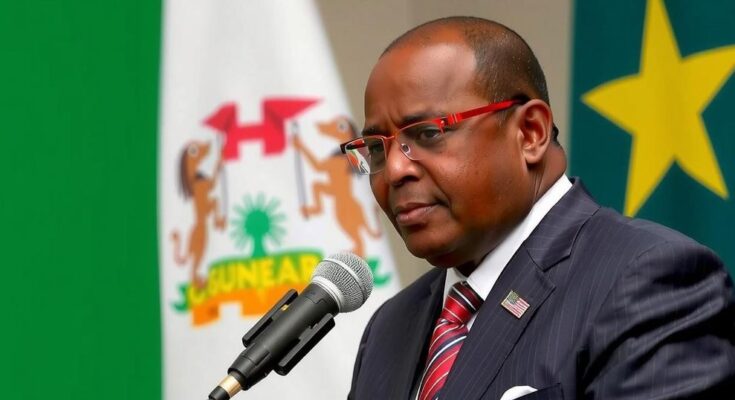Guinea Bissau’s President Umaro Sissoco Embalo has indefinitely postponed legislative elections set for November 24, exacerbating political instability. Citing logistical issues and a lack of funds, the postponement follows the dissolution of parliament in December 2022 and ongoing tensions with the PAIGC coalition. The country, one of the poorest in the world, continues to grapple with challenges to its democratic processes amid a contentious political landscape.
The President of Guinea Bissau, Umaro Sissoco Embalo, has indefinitely postponed the legislative elections initially scheduled for November 24, 2023. This decision extends the political stalemate that has engulfed the nation, following a series of destabilizing events, including the president’s recent decision to dissolve parliament after an apparent coup attempt in early December 2022. Despite setting an election date last summer, issues such as logistical challenges and financial constraints increasingly suggested that the vote would be delayed. On November 1, Aristides Ocante da Silva, the minister for territorial administration, indicated that the elections were unlikely to proceed as planned due to these ongoing difficulties. Subsequently, President Embalo announced on Saturday that he would formalize the postponement, which he has now accomplished by canceling the previous decree establishing the election timeline. However, a new date for the elections has yet to be determined. The postponement of the legislative elections has raised concerns not only about the future political landscape but also about the upcoming presidential election to replace President Embalo himself. Following the June 2023 elections, the African Party for the Independence of Guinea and Cape Verde (PAIGC), a coalition opposing Embalo, secured a commanding parliamentary majority. This has resulted in heightened political tension and a challenging partnership between the president and the coalition’s leadership. As one of the poorest nations globally, Guinea Bissau has struggled to secure necessary funding for the elections. The country, which has experienced multiple coups since gaining independence from Portugal, attempts to navigate back towards a stable constitutional order. Even as progress has been made over the past decade, ongoing political turbulence remains evident. Since assuming the presidency in December 2019, Embalo’s term and the subsequent presidential election date have sparked considerable debate and controversy.
Guinea Bissau, a small West African nation, has a history of political instability marked by a series of coups and corrupt governance following its independence from Portugal. Since the election of President Umaro Sissoco Embalo in December 2019, the political atmosphere has been fraught with tension, particularly after the PAIGC party gained a majority in parliament in June 2023. The postponement of elections reflects the continuing strife and the difficulty in establishing a stable political environment, as logistic issues and financial shortages impede the electoral process.
The indefinite postponement of legislative elections by President Embalo underscores the ongoing political challenges in Guinea Bissau. The country’s struggle with financial instability and logistical constraints complicates its democratic processes. Entrenched political divisions, particularly with the PAIGC’s majority presence in parliament, have further exacerbated the situation. As Guinea Bissau attempts to stabilize its governance, the path forward remains unclear, necessitating urgent attention to political and economic reforms.
Original Source: punchng.com




